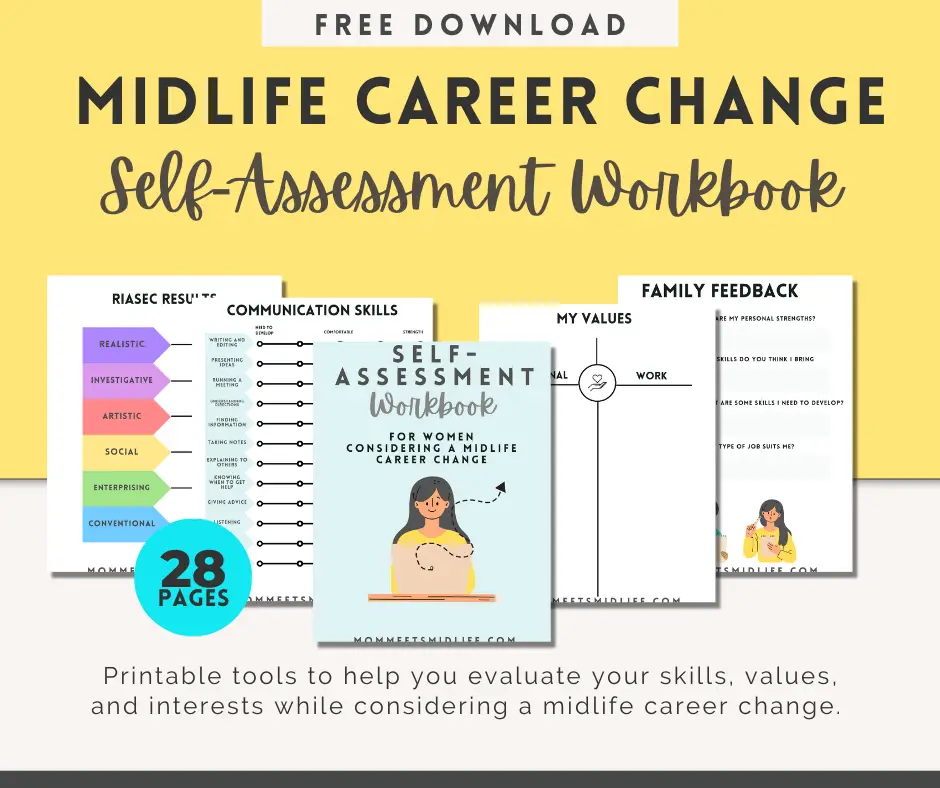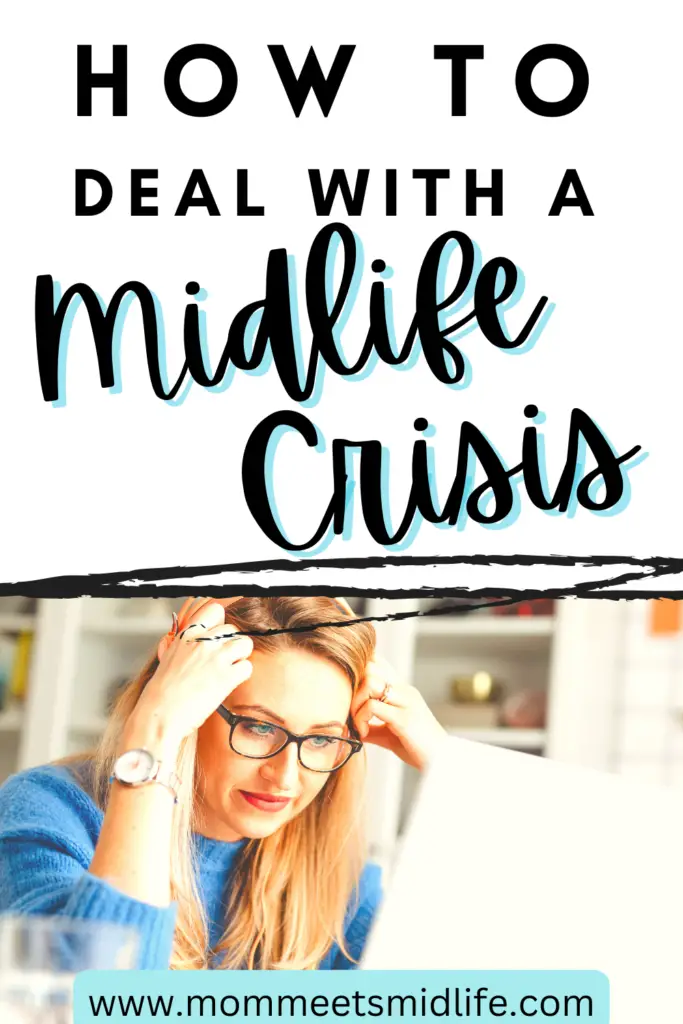Last Updated on March 12, 2023 by Erin

Are you wondering how to deal with a midlife crisis? You’re not alone! Midlife crisis is a common phenomenon that many people experience during their late 30s, 40s, or 50s.
It is a period of reflection, self-doubt, and uncertainty about the future. You may feel dissatisfied with life and start questioning the choices you’ve made. It is a challenging time, but it is possible to navigate through it and emerge stronger and happier on the other side. So, let’s explore how to deal with a midlife crisis, shall we?
**This post contains affiliate links. This means if you click and buy, I may receive a small commission (at zero cost to you). Please see my full disclosure policy for details.**
Recognize the Signs of a Midlife Crisis
It is important to acknowledge these signs and then accept that they are a natural part of midlife. The signs include, but are not limited to-
- feeling bored at work
- feeling unfilled by your career
- restlessness
- anxiety
- apathy towards activities you used to enjoy
- feeling stuck
- questioning your identity and values
- uncertainty about your purpose in life
- thinking about mortality and the passage of time
- dressing and acting differently
These “signs” may lead you to feel the intense need to make a change in your life.
Related post: Midlife Crisis for Women
I started to recognize these sounds around age 35, so it was a fairly early “midlife crisis” for me. This is just my theory, but I would guess that many millennials like me, experienced some midlife pains early due to the effects of the pandemic. Let’s be honest, that was a crisis in itself for most people.
Over the last few years, the burnout with my job became so intense I finally had to recognize a change was needed. Next year, I’m transitioning from a full-time working mom to a part-time working mom.
How to Deal with a Midlife Crisis
1. Self-Evaluate
Ok, so you’ve recognized some signs of a midlife crisis. Now it’s time to take a good hard look at things. Self-reflection and introspection are important when considering the possibility of a midlife crisis because they can help you gain a deeper understanding of yourself and your motivations.
You can gain insight into why you may be feeling restless, unfulfilled, or uncertain about your future. Maybe you’ll uncover some negative patterns that have been holding you back. Have you been putting everyone else’s needs first? Have you been avoiding risks because of a fear of failure?
This process might be uncomfortable but by taking the time to reflect on your life and your motivations, you can gain the clarity you need to move forward. This is your chance to turn a midlife crisis into a positive transformation towards the life you want.
The 4 big areas to evaluate are: career, relationships, health, and finances.
Career
Are you happy with your job? What could you change at work that would make it better? If there are too many things outside of your circle of control, maybe it’s time to try something new. I have a whole post with tips for making a successful midlife career change. I’m right there in the trenches with you!
Another question I had to ask myself was, is my job fulfilling? Is it meaningful and making a difference? If you’re anything like me, you are questioning the lasting impact you will have on this world. If your job feels like a waste of time…get out and find something new!
If you are truly considering a midlife career change, I’ve put together a FREE self-assessment workbook. Complete a skills inventory, values inventory, interest assessment, and feedback interviews. It can give you some great insight into what you’re looking for in a career.

Relationships
Relationships are another area to examine. Are they healthy and supportive?
Communication
OR…are you and your significant other having difficulty communicating with each other? Do you feel like you are able to communicate your needs and desires? If not, you probably feel very alone and trapped. Communication may seem like a minor issue, but it can lead to bigger problems down the road.
If you are having trouble communicating with your significant other, you might want to seek out the help of a relationship counselor. Just because you’re having relationship issues in midlife doesn’t automatically mean you’re headed for infidelity or divorce.
Different Goals
Maybe you and your partner have different life goals as you’re transitioning into midlife. That’s very common! Are you aware of your life goals and your partners? Maybe it’s time to write them down and compare. I wasn’t entirely sure of my goals until I took the time to create a vision board. It’s ok to have different goals but maybe you need to do a better job supporting each other’s goals and dreams.
Hormones
Hormones can lead to changes in desire. It’s not fun to talk about but it’s reality. Reach out to your doctor and see if they have any suggestions. Sometimes a little self-care and fun reading (*wink wink*) can do wonders.
Empty Nest
My children are still pretty young…any other midlife moms with little ones out there? BUT I know many other midlife women are experiencing empty nest syndrome. Talk about a huge shift in the family dynamic! You might feel a little disconnected with your spouse once the kids are gone.
Before I move on to the next points, I should also mention that if you have been stuck in a very unfulfilling or even abusive relationship, get out. Only work on relationships worth saving. You matter.
Health
This is a bit of a bummer and it’s been a difficult one for me to accept. Sometimes a midlife crisis can be caused or exacerbated by health problems. As we get older, we run the risk of health problems and chronic conditions. I have to keep an eye on my blood pressure and cholesterol. Exercise and diet aren’t my favorite things in the world, but once I took a good hard look in the mirror, I recognized that I owed it to myself and my children to take better care of myself. Intermittent fasting and short walks with the dog have done wonders.
Do a little health audit. Are there histories of certain health problems in your family? What are you doing to prevent them?
If you have a chronic health condition, are you managing it well? What can you do to alleviate the symptoms or improve your well-being? Are you keeping up on your appointments?
Finances
Are you in a slump because your finances aren’t great? Maybe you have a lot of debt. Maybe you aren’t as wealthy as you expected to be at this point. Or maybe you have accumulated a lot of wealth, but you’re scared to take risks. Our finances can definitely leave us feeling stuck and anxious for a variety of reasons.
The good news is there are lots of things you can do to improve your financial situation, even in midlife. If you need to take a closer look at your finances, start tracking all of your spending. I really mean all of it. Figure out what is necessary and what is frivolous.
Empower is a free website I use to get a handle on my spending and see my overall net worth. It’s a really powerful tool.
Empower Personal Wealth, LLC (“EPW”) compensates FlexOffers.com, LLC for new leads. FlexOffers.com, LLC is not an investment client of Personal Capital Advisors Corporation or Empower Advisory Group, LLC.
2. Explore Your Interests
After you’ve evaluated the different areas of your life and determined where you might be able to make some changes, it’s time for the fun part.
You see, a midlife crisis doesn’t have to be all negative. It can be a midlife adventure…a midlife transformation…a midlife awakening. Call it what you want, but let’s put a positive spin on it, pretty please? This is the chance for you to make changes FOR GOOD.
Make a list of all the things you already know you’re interested in. Then make a list of the things you’d like to try out. Think of the following-
- jobs
- sports
- leisure activities
- volunteer opporunities
- instruments
- languages
- investment opportunities
- travel locations
Just jot it all down and do a “brain dump.”

3. Set New Goals
You’ve self-evaluated and you’ve explored your interests. Now it’s time to set some goals. Woohoo!
Setting new goals can help you regain a sense of purpose and direction. Make sure that your goals are SMART. SMART is a framework for setting and achieving goals that are specific, measurable, achievable, relevant, and time-bound.
S – Specific: Goals should be clear and specific, defining exactly what is to be achieved. This means identifying the who, what, when, where, why, and how of the goal.
M – Measurable: Goals should be measurable, so progress can be tracked and success can be determined. This means defining specific metrics or criteria that will be used to measure progress toward the goal.
A – Achievable: Goals should be achievable, so they are challenging but still realistic. This means ensuring that the goal is within the individual’s abilities and resources.
R – Relevant: Goals should be relevant, so they are important and meaningful to the individual. This means that the goal should be aligned with their values, priorities, and larger objectives.
T – Time-bound: Goals should be time-bound, with a specific deadline or timeline for achievement. This means that the goal should have a specific target date for completion and a clear schedule of action steps.
Here is an example: In order to save for retirement and be financially secure (relevant), I will save $833.33 each month (specific) until I have a total of $50,000 (measurable) five years from now (time-bound). To achieve this goal, I will do a low-buy challenge and find additional sources of income, such as a part-time job or freelance work (achievable).
4. Develop Healthy Coping Strategies
A midlife crisis can easily spiral if you don’t have healthy coping strategies. Here are a few coping strategies that can help you deal with midlife crisis-
- Practice mindfulness: Mindfulness practices, such as meditation or deep breathing exercises, can help you stay grounded in the present moment and manage feelings of anxiety or overwhelm. Headspace is an amazing app that I have used to develop healthy coping strategies.
- Practice self-compassion: Be kind and gentle with yourself as you navigate this difficult time. Remember that experiencing a midlife crisis is normal, and that it’s never too late to make positive changes in your life. Try saying some positive affirmations throughout the day.
- Practice self-care: You have to make yourself a priority when working through a midlife crisis. Make sure you are getting enough rest, eating a healthy diet, and exercising regularly. Engage in activities that help you relax and reduce stress, such as meditation, yoga, or massage. Take time to connect with nature and enjoy the simple pleasures in life. Lucky for you, I’ve already put together a GIANT LIST of easy ways to practice self-care in midlife.
- Try a gratitude challenge: Make it a habit to focus on what we’re grateful for. When we do, we train our brains to look for the good in every situation.
- Look for support: Whether it’s talking to a trusted friend or family member or joining a support group, find connections to help you feel less alone in your midlife journey. Surround yourself with people who are positive, supportive, and encouraging. Reach out to those you trust and respect.
5. Seek Professional Help
Alright, you’ve self-evaluated, you’ve explored your interests, you’ve made some personal goals, and you’ve worked on your coping strategies. Way to go!
But wait…what if you’re still struggling? You’ve tried the above steps and you still aren’t sure how to deal with a midlife crisis. First of all, that’s to be expected. A midlife crisis is going to be an ongoing thing and that’s natural. In fact, you should be constantly re-evaluating and exploring the signs of a crisis.
A very important component to dealing with a midlife crisis is getting the help you need. A midlife crisis can get out of hand quickly if you do not have the right coping skills. We all understand how easy it is to dupe ourselves into feeling better with shopping sprees or binge eating. Those are super quick hits of dopamine that really just make us feel worse afterwards.
It’s possible you will need some help gaining the right coping skills to handle a midlife crisis. A therapist or counselor can provide you with the support and guidance you need to navigate this challenging time. They can help you identify the root causes of your feelings and develop strategies to overcome them.
6. Embrace the Change
It is important to embrace change during a midlife crisis. Accept that your life may be different from what you expected or planned.
Recognize that change is a natural part of life and can be a positive force for growth and development. Be open to new experiences and opportunities and embrace the unknown with curiosity and excitement.
Enjoy the ride!
Final Thoughts on How to Deal with a Midlife Crisis
Dealing with a midlife crisis can be challenging, but it is possible to navigate through it and emerge stronger and happier on the other side. Sometimes we need a little help developing coping strategies to get through it, and that’s ok! Don’t be afraid to seek help when you need it. I hope know you a bit more about how to deal with a midlife crisis.
Over to you- Have you found some great ways to deal with a midlife crisis? Let us know in the comments!
Don’t forget to share this post with someone who might need to read it. Be sure to pin this post so you can refer to it later 🙂
Sincerely,
Erin


